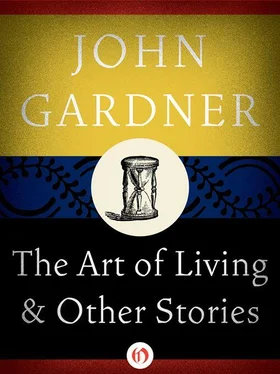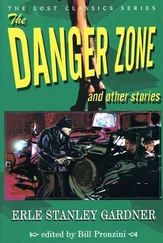On the other hand, no one could be more responsive to the anguished wellings and sweet palpitations of the music itself. When Mahler was played, or even the coolest, most objective of Bruckner, tears would run streaming down Professor Klingman’s nose, and sometimes he would sob audibly, so that everyone around him was made uncomfortable. At musical jokes he would sometimes guffaw, though how a man so ignorant could know that the musical jokes were jokes was hard to see. And even when the music was neither tragic nor comic, merely sang its way along, in a manner of speaking — one of Mozart’s less dramatic concertos, for instance — Professor Klingman could manage to disgruntle his neighbors. Sometimes he tapped his feet, sometimes he nodded (slightly out of time), and sometimes, especially to Kabalevsky or Liszt, he would thump his rolled-up program. People touched him on the shoulder, whispered politely but sternly in his ear. His contrition, at such times, was touching to see, but it lasted for only a few minutes. Charitable people ignored him and said, when the subject of his concert behavior came up, “Well, music is all the poor man has, you know,” or, “Well, he feels things deeply, you know; too bad more people don’t.” All our concert-hall ushers knew him, and the leader of the music school’s string quartet would always look up and smile if he was present. Not that he was loved universally, of course. Sometimes children who were not well brought up — and sometimes even college students — mimicked him cruelly, thumping their programs, bobbing their heads, and pretending to swallow back agonized sobs. To such mockery, of course, Professor Klingman was oblivious. From the first note to the last, even if the concert was abysmal, Professor Klingman was in heaven.
One evening in late autumn, Professor Klingman attended a School of Music concert which was advertised as offering “three contemporary pieces.” He would never have attended had he any idea what he was in for. Professor Klingman, it should be mentioned, was by no means a man of conservative taste. He had disgraced himself by literally whooping his emotion at Janáček’s Slavonic mass and had once sat, enraptured and stunned, unable to applaud, at a performance of Bartók’s Concerto for Percussion, which he later remembered as Stravinsky’s greatest masterpiece. But this particular departure from musical tradition — this so-called “three contemporary pieces”—was a new and terrible experience for him. It opened with a cello concerto in which the soloist used not a bow but a saw, a fact Professor Klingman missed at first, because of his eyesight. By the end of the piece, which was distressing enough in any case, the cello had been sawed in two. The second piece featured two radios tuned to different stations and a violinist expressing his musical impressions of a life-sized photograph of an ape.
Timid as Professor Klingman was in life’s more ordinary situations, he reacted to this music with the unselfconscious abandon that had made him mildly notorious among concert-goers in our city. He wrung his fingers, groaned, covered his eyes, and on one occasion cried out loudly, “Oh my God! My God!” On each side of him and behind him, embarrassed fellow sufferers labored to shush him — to no avail. He caught the pale hand of the lady beside him (Mrs. Phillips, the wife of Reverend Irving Phillips, who plays second clarinet in our philharmonic orchestra) and whispered, violently shaking, “Insane!”
“Be still!” she whispered, cold as ice, though it was clear she was not in complete disagreement. She was tall and stately, with a pale blue face, a face almost exactly the color of her pearls. She was breathing like a person who is about to experience a heart attack — whether from anger at the musical outrage or from anger at the mad old man beside her, no one could say.
Mrs. Phillips’ words had no effect on the professor, but a moment later he became aware, as one could see by the anxious craning of his neck and the darting of his eyes in their thick-lensed glasses, that he was surrounded by mimics, all wringing their fingers, twisting their faces into masks of agony, and moaning and groaning, driving their timider friends into shuddering lunes of demonic giggling. Professor Klingman clung to Mrs. Phillips’ hand, feeling sick at heart with shame and anger, and squeezed his eyes shut, waiting in silence for the intermission. He could not notice, in his misery — or perhaps did not notice because of his eyesight — that a man in the box to the left of the stage was watching all he did with a queer fascination, watching as a scientist might study an insect, never shifting his gaze for an instant toward the stage.
At last (incredibly, from Alfred Klingman’s point of view) the intermission did arrive, the houselights came up, and he was able to scramble, or, rather, stagger, to the aisle and up it, toward the exit sign, pushing through the crowd in a way quite unlike him, apologizing right and left to faces he probably could not see, since he was weeping. He somehow reached the cloakroom and retrieved his hat and coat, then pushed toward the street door. There, however, he found he could go no further because of the violent pounding of his heart. He leaned on the wall, wide-eyed, pink-nosed, clutching his chest as if aware that if he did not calm himself, this excruciating night might be his last.
“Monstrous!” he whispered over and over, probably more loudly than he knew. “Monstrous! Blasphemous!”
Then, as men will do in such desperate situations, Professor Klingman tried to reason with himself. “Yet what harm, after all?” he said loudly, his red-lidded eyes squeezed tight shut. “No doubt an inexpensive, even worthless cello. A harmless little joke. What harm in that?” But his heart, it seems, was thudding more violently now than ever, and, judging from his face, some sorrow vast and plangent as the sea was threatening to drown him. He opened his eyes as would a drunken man to steady himself by the solid lines of furniture and vistas of neatly patterned carpet.
A small, anxious crowd had gathered around him, largely composed of people he knew, fellow regulars, though apparently he couldn’t focus any faces. And now one of the crowd moved forward, extending his hands toward him.
“You’ve had a shock, my good man,” the stranger said kindly, taking hold of the professor’s trembling hands. “Come with me, I beg you. Let me buy you a drink.”
Professor Klingman accepted — being, of course, in no position to resist, though not a drinking man. Little did he know what man he was putting his trust in. Slowly — to the crowd’s considerable relief — the two men went through the foyer, the professor leaning on the younger man’s arm. They entered the lounge, where the younger man guided Alfred Klingman to a table by the window looking out on a river and park. The night was tranquil, dark except for an occasional streetlamp. On the grounds of the park, which were safer in those days, one could see, here and there, pairs of lovers walking, and over by the golfcourse a woman with a dog. The younger man brought drinks of some kind, then took a chair opposite Alfred Klingman’s and sat watching him fixedly, much as he had watched from the box to the left of the stage.
Gradually the professor regained his composure.
“The music disturbed you deeply, I see,” the stranger said.
“I’m afraid so,” Professor Klingman confessed. “I’m afraid I behaved like a dreadful old fool.” He made an effort to smile, but blushed instead, a slow blush, remarkable on a man so old, that rose to his hatbrim. “A harmless little joke, harmless little trick on the audience—” He broke off abruptly. His eyes filled with tears which he made no effort to explain, if, indeed, he knew their explanation. He removed his thick-lensed glasses and wiped them on his handkerchief.
Читать дальше












